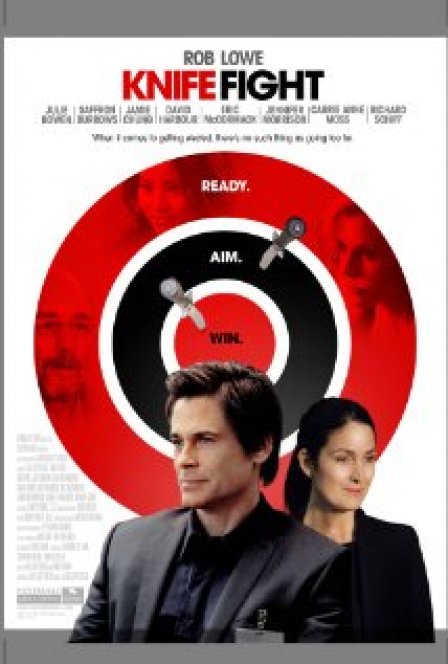“Bush has an obligation to put this stuff out. It’s information the American people deserve to know.”
—Chris Lehane
Bill Guttentag is no stranger to advocacy filmmaking, having turned out several noteworthy and politically important documentaries over the years. However, his feature-length films have never achieved the same amount of relevance or impact. 2007’s Live! is a prime example of the paint-by-numbers moral rectitude the director employs in his largely polemic works of fiction. In his other vocation as a lecturer at Stanford’s B-School, Guttentag has plenty of opportunity to collaborate with high level political operatives, and his dealings with revered Democrat strategists Mark Fabiani and Chris Lehane led to the recent publication of Masters of Disaster: The Ten Commandments of Damage Control. This in turn inspired Guttentag to work with Lehane on Knife Fight. Lehane, who shares a writing credit with Guttentag, draws upon his own experience as a Clinton administration crisis management guru to create a story about the dirt and questionable morals involved in successfully navigating the world of electoral politics.
Rob Lowe plays Paul Turner, a stand-in for Lahane. Thankfully the filmmakers didn’t feel the need to use an anagram. Turner is the most successful damage-control consultant in American politics, and he uses his almost preternatural skills at manipulating the media and playing to the emotions of everyday Americans to get his candidates (re)elected. Under his wing is a recently graduated first-generation Korean young woman, Kerstin (Jamie Chung), who mainly functions as an excuse for Lowe/Lehane to wax poetic about how badass he is at doing politics. Because Kinfe Fight is an apologia for philandering Democrats, each scene is structured around some trite speech rife with aphorisms delivered by Lehane/Lowe about how politics is a dirty game, and what matters more than your candidates criminal proclivities are how much into reform he is. It’s an interesting mix of world-weary cynicism and naïve idealism that kind of turns boring really fast. All of the in between is just filler until we get to hear Lowe tell us what’s really up.
What strikes the oddest note in the film is the willingness on the part of otherwise doe-eyed idealist Kerstin (Jamie Chung) to excuse what most modern journalists would consider rape (or at least rape-y). One of their candidates, while receiving a massage, totally does it with his masseuse, who naturally threatens to expose the story, jeopardizing his chance of maintaining his Seat. Regardless of the fact that there’s an obvious and huge imbalance of power in the fleeting sexual relationship between senator and health professional, Turner and Kerstin soldier on, smearing the young woman mercilessly. Any misgivings on the part of those involved in the assassination of this far from innocent woman’s character are quickly assuaged by the fact that the senator in question really wants to tackle childhood obesity.
By excusing the moral (criminal) shortcomings of politicians they consider to be on the correct side of the aisle, Lehane and Guttentag essentially champion a By Any Means Necessary mentality, where the ends always justify the means. A tacked-on suicide attempt plot thread seeks to dispel some of this bare-faced cynicism, but ultimately we’re left with a piece that seems as much about exorcising the lingering ghosts of Lehane’s political career as it is about how much better Democrats are than Republicans. Neither of these two things make for very riveting cinema. If Kinfe Fight’s unabashed moralism had hinged upon the frailty of human beings — and the need to scrutinize one’s own biases and political leanings to make sure one wasn’t overlooking basic morals and destroying other peoples’ lives in the process of furthering those leanings and biases — it still would’ve been lame, but at least it wouldn’t have been laughably insulting toward its audience’s intelligence.

